It is the “blue hour” here – the hour at which the fine hues of cerulean blue ice glimmer darkly by the morbid light of the gauzy winter sun. But in this village, there may not be a single man who might know what “cerulean” means – and insofar as “gauze” is concerned, well, only a man who’s ever had a broken arm might know it. And there are many here. Men with nine fingers, or sometimes less – men who sup their whiskey from a one-armed spoon by the smoky light of the hand-hewn tavern. In the blackening beams of fir, the broadaxe has etched its marks in grainy, primitive wood – signs of men before us who’ve also cut their fingers off or even met their grave out in the bogs.
But I am only in that tavern in my mind. I can scarcely muster the kind of nervy apblomb a man might need to muster in order to rise from his plush plaid chair, don his jacket, lace his boots, and stumble down the village hill out into the snow for a pint. Far better to take the pints I’ve got laid up here in the rafters of the porch – and to revel in them privately, allowing them to sizzle cold way down in my spine; and for my attire I will continue to wear the bright-red one-piece longjohns that a man might tend to wear in any North Country February. Meanwhile, a new beard grows upon my face like gangly moss upon an ice-chilled glacial erratic or a granite boulder – the sort of fuzzy hair that moves only in a strong wind or by the untamed rapids of the nut-brown mountain rivers. I am here now – I am in residence at my new estate. I am living in the Adirondack Mountains – those fearsome, somber ranges and wizened old hills flanked with blackfly-choked swamps. Above them, grim overcast reigns year-round.
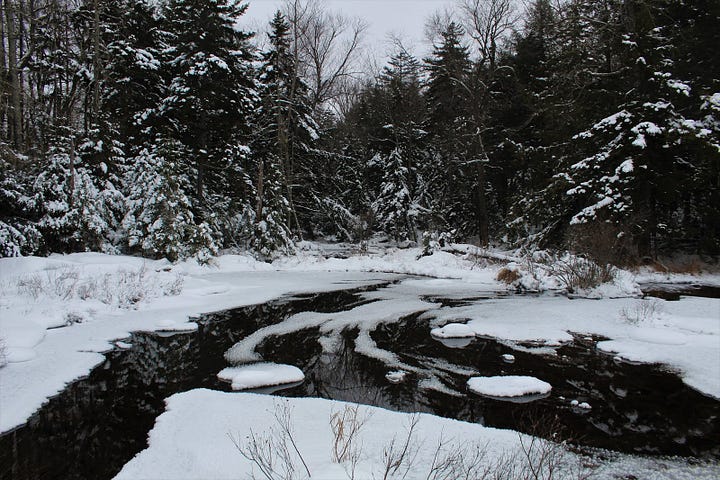
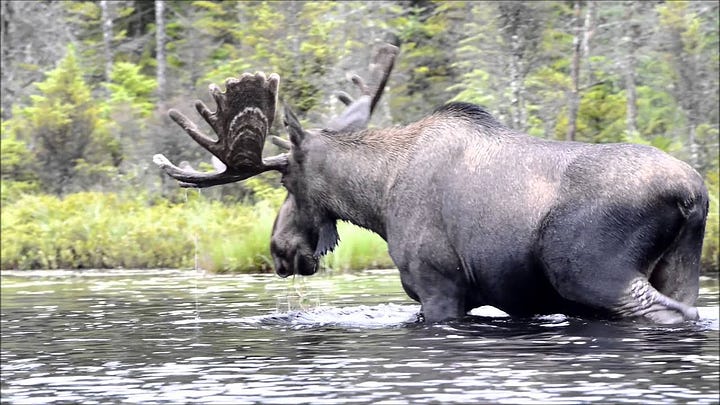

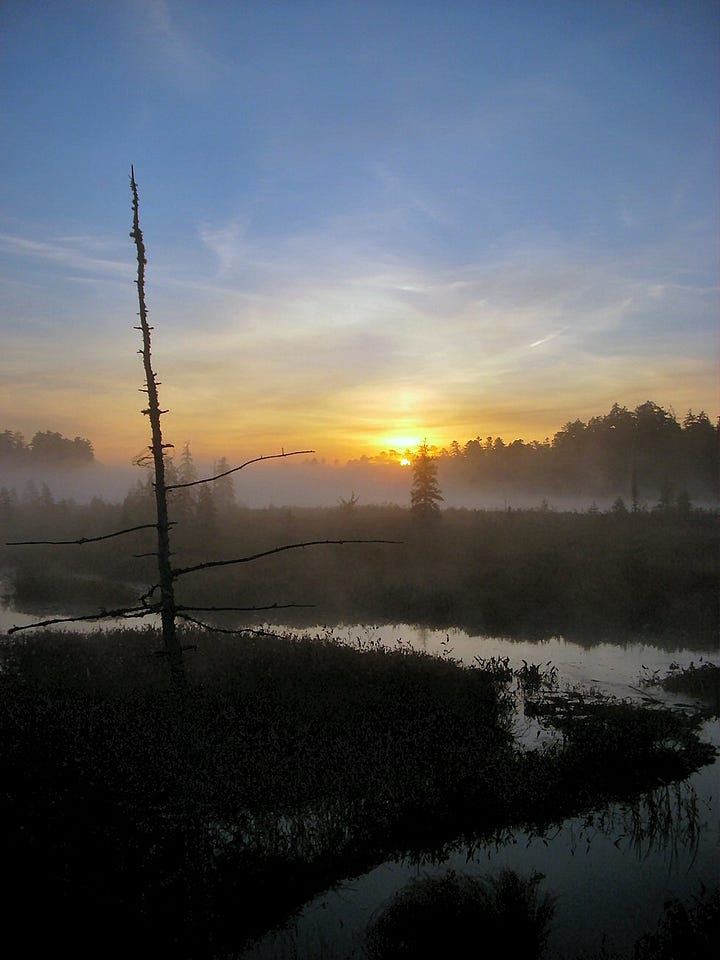
South of me, one-hundred-and-twenty miles of wilderness sprawls, through which only three state highways go. Besides these, which are only very lightly trafficked – a handful of wild dirt roads, most of which are now blanketed under heavy snows. Though I was a boy on the other side of that wilderness, were I to wish to trek south home, I could do it in a week – and on that long route south, I would have no need to pass through a single village or town. If I was especially dedicated, I’d be certain to see more bears than automobiles, and for every man I laid eyes upon along the way, I might see a thousand pines.
North of me – a sprawling alluvial plain, laying dumb like a sopping wet pancake dotted with dilapidated villages and fallowing farms. No rusticators make any kind of a procession here for the summertime, unlike here in the mountains. No camps or gilded estates, either. A realm of provincial obscurity and tenant-farms, all turned into hotbeds for loutish pigeons and scraggly old mechanics. By them, a handful of villages where memories are sold cheaply and the only export is disgruntled teenagers flying the coop. The people of this ‘vast northern pancake’ of land reside in a zone I might refer to as the ‘trans-Canadian exclusion zone’ – a land of Francophone radio and moonlight and syrup and corn. Above them just a few miles, Canada itself bustles with whatever it is that Canada has ever bustled with – most of us aren’t sure just what that might be.
And to the east and west, this territory is bound by two large lakes that obscure whatever could lay beyond them in Vermont and Ontario. Liberals, I hear, inhabit either side – but these are alien lands that have not been explored nor traversed by most people here, and so the rumor shall remain totally unconfirmed (like most rumors around here).
At the center of the map, of course, is me; for what man is not at the center of his own map? It is only if I should pierce the shank of my boot with a rusty nail and be wanting for a doctor – or if I should sin so gravely I might require a Priest – that my cartographical center could change. Firmly, I am planted here, though I am a new arrival, but in truth, I have just this week purchased the blessed gravesite where I will lay when the jig is up and my long, strange act is finally over. The very chair in which I sit may well host me in my final breaths, and the view I now have out the big bay window of my estate may be my final view of the earthly realm. On that day – which, God-willing, will come only in fifty or perhaps even sixty years’ time – if I have raised our children correctly, they’ll know to fire a salute over the valley and to crack open the firkins of cider and ale – to let the accordions bellow and the midnight oil burn. The Requiem Mass will, I hope, involve a rambling and firy homily – and at the final blessing, the unbelievers might nervously quake a little at the tireless truths of the good and heavenly God. And then, in the Church basement, lasagna made with beaver meat in great big bowls, and if I have lived the life I know I ought to live, the whole village will be chattering over my loss.
Who knows – it is hard to tell how the end may come or what it may contain, and for a man so youthful and vigorous as I ought to be at my age, I should not linger over such subjects lest I sink into a morbid state. Yet, still I remember when my grandmother (who was a true ‘spring chicken’ at the time) went along and purchased her gravesite in the village of my youth. With good knees and a face full of youthful color, she actually laid down on the gravesite, cackling and bellowing brightly, saying: “look! this is how I will be! ha ha ha!”
O, how graceful and spirited is the life of the one who goes and cracks jokes on the steps of the mausoleum – jabbing the Grim Reaper in the ribs, blustering with laughter out in the cemetery with the Priests and the gravediggers. Memento Mori!
So I, for my part, do understand that maturity involves some recognition not only of death but of finitude. For it is the limits a man accepts that make him the man. Or, more to the point it is not a question of accepting limits but of celebrating them with boldness and gusto. To draw a line around one’s porch or desk or hamlet and to stay well enough within it is to truly thrive. The wide world has only fluttering madness in store for you or anyone else. Big, broad, shining roads and railways deliver a man’s flesh and bones to wherever his ticket would allow him – but the soul does not accompany. And these days, what with so much motoring (the likes of which would’ve drawn real ridicule in more reasonable eras) the whole country over has been remade into one great big superhighway to savagery. With great speed, the whole map of this country gobbles a man whole – until he is a nomad without a tribe.
Even the miserable Monatagnais indians who might’ve (and I do say might’ve) managed to settle here in these mountains in the thirteenth century, vagabonds though they would have been, were better off than today’s “road warriors” and “frequent flyers.” For though they lived in Hobbseian poverty, quite possibly eating bark in times of grotesque famine, wandering hungry – they were at least bound by the speed of travel achievable by their God-given feet, or, if they were crafty, their spruce-bark canoes. This was their bulwark against true delirium. Today’s “nomads” – the U-Haul sort – are granted no such luxury. They are free to press as far into cartographical madness as they wish, and for it, the province of their inheritance shall only be placelessness and confusion. That’s what Cain earns when he starts acting like Abel ought to act.
I seem to have evaded the fate myself, for I have purchased an estate that strikes me as being totally immovable – and quite possibly unsaleable too, owing to the ghastly mold that has rotted a few of this house’s beams. Now, I am on my own – I am the captain of a ship that has no keel, and I drive a great big bus that has not even a single wheel. There is no automobile in my driveway, either – and so I can make no getaway from this life I have purchased. Thankfully, the environs surrounding this house (which is otherwise stellar, save for the slightly sinking floor) are extremely pleasant – so pleasant, I think, that if the view out of my office window were indeed my final sight of God’s fantastic creation, I would be well pleased.

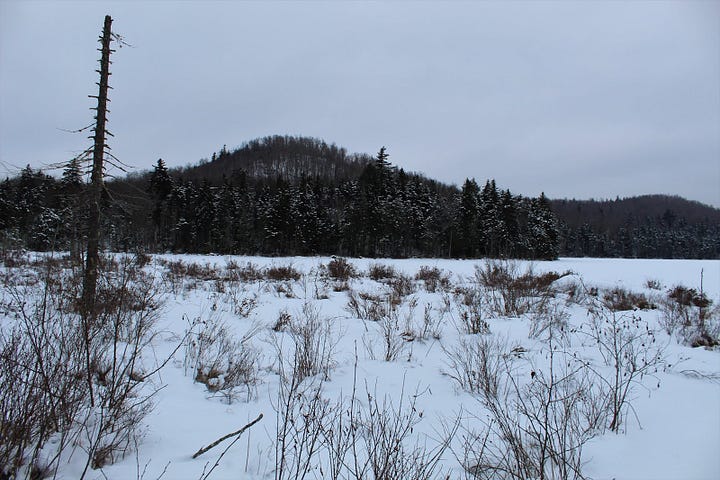
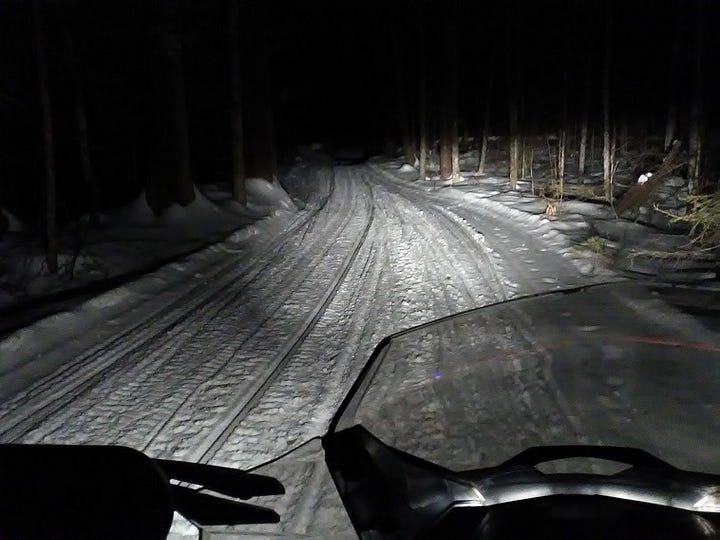

And, in the same sort of vein, the village contains all that we could reasonably need in the way of victuals. A store, two-hundred-and-fifty provincials and rustic eccentrics, a Church with the Eucharist, and a good tavern where rollicking men sit like Sultans suckling at cans of Canadian beer. Below them, the river is choked with trout, and in some places, beavers too – the forests are home to tribes of wandering deer and vast, endless tracts of blackberries. With our narrow side-yard garden beds and an occasional sack of flour, I have no reason to believe that we cannot live a royal’s life here – and our children should benefit from it famously. If my mind on the matter of parenting should be proved correct, good wild land surrounding a home can well enough make up for whatever a mother and a father might lack in the way of rearing a young fellow into a man. All that should be required of us is the occasional prayer that whatever sons we have do not slip into a deathly cataract on the river to drown. Such accidents, I do believe, are all caused totally by the devil.
BUT – I have veered far off course, with no regard for precious time, nor for the thematic backbone of this obtuse letter I’ve endeavored to write to you, my friend. Wordiness comes to me as easily as engorgement of the cheeks comes to brother squirrel – and on words, dear reader, it is quite possible that you are now already choking. What I have sought out to achieve here by writing you, is to make a sort of explanation for the weaseliness that has gripped me and sullied my written work and travels.
In a flourish of ignorance and machismo, I set out to “Fall Back in Love With America” with my wife. The reason for this heady, romantic, over-the-top affair was simple: Not long ago, somewhere in Idaho, the government murdered a man’s son and wife over a phony charge involving a gun and an undercover federal agent. Helicopters flew over – the media baselessly called the man a Nazi and his home a “doomsday compound” – and ATF Agent Lon Horiuchi (which, no doubt, cannot be his real name) opened fire on Vicky Weaver from above. She was holding a baby. I read her husband’s book, frighteningly titled “THE FEDERAL SIEGE AT RUBY RIDGE” shortly after I’d proposed to my wife. My new father-in-law was personal friends with Mr. Randy Weaver, and spoke darkly of what the government is willing to do to Uncle Sam’s own in the Land of the Free. Naturally, I knew that what follows marriage is children – and I began to picture my beloved wife holding a baby as the ATF Agent put her in his sights from his helicopter.
And so in a fever I leapt – “We must move to PATAGONIA – land where Jesse James and other true Americans fled for the sake of their freedom!” Immediately, I began babbling in Spanish at my wife, drinking Yerba Mate and Malbec, and gobbling steak as if I were already a gaucho. “Here is a ranch in la Provincia de Chubut, mujere – tierra bonita y seco y muy barato!” She could hardly hear me over the Cumbia music bellowing loudly from my radio speakers. Being morbidly averse to aviation, I found tickets on a 14-day steamship from Corpus Christi, Texas to Buenos Aires, and nearly bought them for a six-month sojourn in the austral summer – until a few commenters on a website urged me to reconsider.
“You are a Patriot,” they said. “You are an antique fellow whose blood is still young – things will change, you can thrive, America is FOR YOU!”
At first, I blustered as a horse blusters his lips, indignantly, and rejected them. And then I slept on it and prayed and stared up at the stars. It was wintertime, and the chipmunks were in their torporous state beneath the snow in dark little burrows. Icicles wept tears for the dying gasps of my patriotism – and the US Coast Guard flag I once served under hung on the porch, somersaulting in the sunset’s evening winds. Now, the fever really began to grip me – I looked at my good wife who was bursting with vigor and passion, whose eyes followed my lips as I mouthed our ten-thousand possible futures, all of them sputtering and bellowing from me like so many wild-eyed incantations and spells. “I would do that,” she would always dutifully say, whatever it was.
It was only a few weeks ago that she admitted she was simply giving me space to think. God bless her.
Then – I took to the internet, leaping up onto my soapbox in the digitized public square. “I will give America a chance,” I said, as if I were the grand emperor of the earth, holding back my wrath from Uncle Sam’s stronghold. “I will see if I can cure my disillusionment with America – and fall back in love with it again.”
It was a complete fever dream of a public gesture; a proclamation so choked with saccharine grandeur that it made my eyes water to type it. But, if it was over the top – so was my disillusionment with America. Ten years of five-lane strip malls, murderous motorists, hellish car accidents (of the sort where you taste the blood first and hear the gunpowder of the airbags second), Fentanyl zombies, crackheads, weeping hookers at bus stations, milk in the dumpsters, shitting in holes in the desert, breaking an attackers ribs with a piece of metal rebar in East Saint Louis. Homosexual gangsters, stone-eyed policemen, pornographers, retarded slaughterhouse workers, zealous Mormon crusaders, clear-cuts, suicides, a thirteen-year-old smoking crack cocaine outside the Piggly Wiggly in Mississippi. Now – Ruby Ridge. Now the government is after us; now we’re under digital biometric surveillance. Apocalyptic visions soared before my eyes; I quite nearly donned my tin foil hat, tempting schizophrenia, urging severe mental illness onto me with gripping passion.
Such was the pinnacle of several odd struggles into which I dove headfirst – leaving the military to become a civilian, learning of life as a married man and anticipating fatherhood, toying with the idea of living a settled life after more than a decade of vagabondage, learning to write for a living with an audience of tens of thousands all giving me a constant stream of commentary on my life and mind, and even the possibility of becoming an immigrant in a foreign country – or a fugitive hiding from a Red, White, and Blue analogue of Soviet Communism.
Of course, the flipside to the darker side of my years on the road were the “highest highs” – the spine-tingling pinnacles of the Mojave by moonlight and the restful motion of the surf along the Washington coast. Unknown hollers in deepest Appalachia where “Mamaw” was drunk and singing loud – Native boys dragging me off the highway and to the Powow to dance and holler in Montana’s high country. Starlight castles of balsam along the shores of Lake Superior; green-eyed North Dakota blondes singing “God Bless America” at the Peewee Football games – combine drivers with beet-red faces giving sloppy, earnest kisses to their chunky old wives in jolly Maine bar-rooms. I could go on and on – and long-time readers know that I have often done just that, perhaps too exhaustively – but suffice it to say at least part of me figured I was already in love with America anyhow.

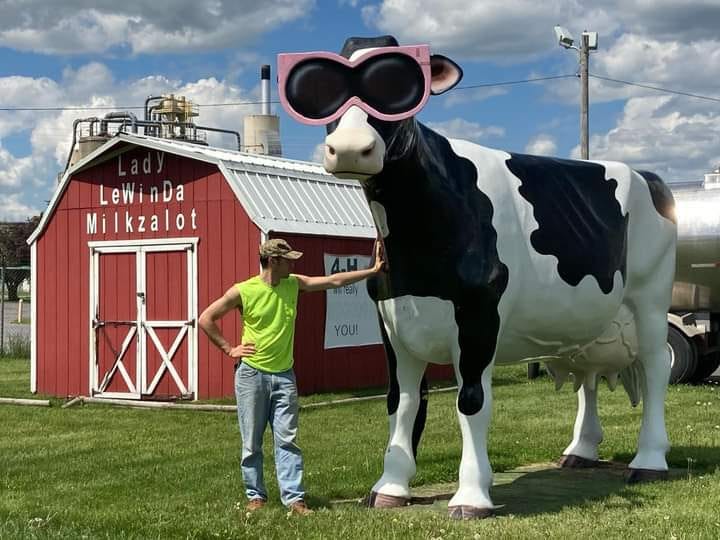
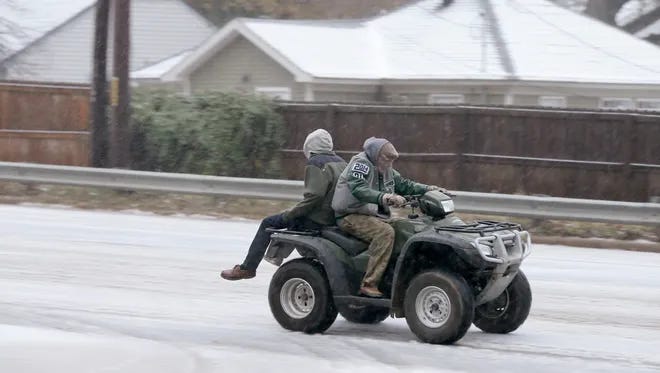
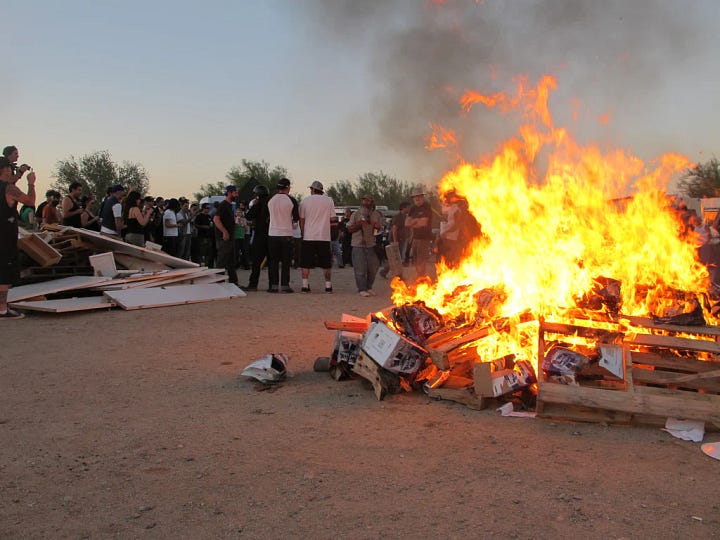
“You’re already in love with America anyhow, Hickman” was exactly what a Colonel in the US Army told me when, at an event in the Rockies, I gave a speech about my intention to take this great voyage around the country. “I think it’d be a fine thing to see you travel this country, of course, but you aren’t fooling anyone here – you love America just fine. Hell you probably even love it more than most.”
His manner of speaking was that fatherly type of speech – the type of speech that reaches deep into an anguished young fellow (especially if he’s a bastard). And what does a father do but settle matters for his anguished sons with simple, firm, and factual proclamations? In my heart of hearts, I privately began to consider the matter totally settled already, thanks in large part to the Colonel’s matter-of-fact assessment.
The public to whom I’d made the promise of doing this mad project, however, did not – nor did the contract I’d signed with a big magazine. I had to continue doing it, even if I was totally ready to head the hell home before I’d even started. And so we kept on it.
And, of course, there were trials involved with traveling as a married man. Hitchhiking was my former mainstay – my central focus and obsession. I spent many more years doing it than most. I was addicted to hitchhiking, as it was the only thing I’d ever done that really felt, at the very bottom of things, honest. The drunk guy that picks up a hitchhiker doesn’t lie to him – why would he? If he’s gonna talk about how he wound up getting an emergency circumcision in Dallas after a bad interaction with his female cousin at the Howard Johnson motel – he’s not going to hold back, because he’ll never see the hitchhiker again. Holy roller preachers preached their most explosive sermons to me, perhaps just to try them out. Tired old ‘cougar’ divorcees tried to woo me in Tahoe – and Cambodian gangsters tried to give me a pound of weed for Christmas in Lowell, Massachusetts. It was all pure madness – and it was all totally real.
That the hitchhiker’s highway is no place for a woman should shock no one. I’d gotten away with what I’d ever gotten away with because I am six-foot-one and husky enough that no one wanted to toy with me too badly. Even the homosexuals – who have a pushy reputation among hitchhikers – were extremely cordial in their propositions to me. Nonetheless, to insert my new wife into a realm of perversion, drugs, automobile accidents, drunk drivers, and truly disgusting highway confessions just didn’t seem wise to me. That didn’t keep her from wanting to hitchhike.
So I took her to Newfoundland, where I’d heard people were generally not known to be a big wild herd of perverted desperadoes and freaks. Thankfully, that instinct proved true – we had no trouble hitchhiking the entire west coast of Newfoundland in a couple weeks’ time, and the honeymoon was a smash hit success. We made it to Blanc-Sablon Quebec – which might be the most remote place I’d ever been in my life – and took a three-day cargo ship back to Rimouski. Days later, we’d have a Zoom call on the street in front of the library in Madawaska, Maine, to talk to Bari Weiss’ sister – an editor at the then 900,000+ reader Substack publication, The Free Press. They wanted to sign me on, they said, for a twelve-month contract. And suddenly I found myself on the telephone with a lawyer from New Jersey – who would, as a courtesy to me, give me a sort of crash-course in contract law.
So began the first few steps in a journey that would take me far out of my depth. Meanwhile, tens of thousands of citizens of the digital commons would hover around me in pixelated droves, each offering their “take” on me, my ideas, my projects, and my life.
“You are a CATHOLIC COWARD who has DISOBEYED GOD!!!!”
“This Hickman faggot needs to get a job and quit begging for Substack money.”
“I wept at your last article – you are the next Hemmingway, God bless you..”
“Your last article was pure purple prose. Get rid of the thesaurus, you try-hard!”
“I know I’m already a paid subscriber, but how do I give more money?”
“Your wife is a lying whore – when you have kids, I’m calling CPS!”
“The magazine we’re starting needs writers – how’s a penny per word sound?”
“This year I turned 86 and if I could do it over again I’d do what you’re doing.”
“Someone oughtta give you the Old Yeller treatment and take you out back.”
It was, and still is, a lot like hitchhiking – constant variety, constant ‘noise,’ a thousand conflicting signals issuing from the mouths of ten-thousand children of God. The most dangerous thing you can be in an environment like this is earnest. Woe to the hayseed lad who reads every comment and takes it as he might take the advice of a kindly stranger on the street. And meanwhile – the folks who paid me to write on Substack seemed almost not to care what I wrote, nor how often I wrote it. Many sent me long, beautiful missives in my email inbox, the sorts of notes that give a man some kind of hope and cut through the delirious noise with the clarifying honesty of a charitable reader. Basically all of them said: “Keep going – write what you want, and publish it whenever you want!” Such generous latitude can drive a man a little mad – and yet he can never complain about it, either, as it is a genuine blessing.
I remember being on the telephone with the lawyer later, in the Berkshires, spitting tobacco juice on the street, sprinting to catch a bus to the train station – if it was late we’d be stuck in the ghetto all night in Springfield. I heard him go on and on about copyright law, and he seemed to be very, very good at what he does. “When I worked with Taylor Swift, it was like this…” and “The clause in section III subpart B, line six – that’s got to change even if they say it’s boilerplate, or you’ll be in a pinch.” I couldn’t keep up with him, and it was starting to feel as if I couldn’t keep up with my own life. The bus came, the call ended, and I looked long at my wife, whose tranquil, sleepy eyes exuded a nourishing, calming energy that told me that God is in control. I said nothing, but I believed what she was saying with her eyes, and took a long, deep draw of the air into my chest.
Within a few weeks, the signed contract was sent over, and I was working on my first draft. So far, so good – things were still manageable. Soon, however, they would not be.
“It is not just having lived that enriches us, just as the money that passes through the hands of the bank teller does not enrich him. What enriches is having lived lucidly, so that each new experience modifies, transforms, expands, and enriches the secret wisdom that geminates in our souls.”
— Nicolás Gómez Dávila, Scholia to an Implicit Text, 1977
To live ‘lucidly,’ as Dávila remarks here, is a task not at all suited to travel nor to the use of the internet. Both high-speed travel and high-speed communications only tempt a man’s mind to willingly venture into dangerously flustering lapses in lucidity – the sort that are very ‘sexy’ on their surface, but that are not remotely congruent with worthwhile thought or creation. In fact, one critic of mine on X reminded me of exactly this when he quote-tweeted a post I’d written about the America project – saying “how can you possibly think you will understand a town or a place by blowing through there as a vagrant for a few weeks?”
Of course, his comments did not spring from a spirit of charity nor any genuine wish to improve what I was doing – they were aimlessly mean-spirited, painting the entire genre of ‘travel writing’ with absurdly broad strokes. And of course, his words annoyed me greatly, and I blew him off. But hindsight being what it is, I cannot actually argue with the thrust of what the man said – because unfortunately, it seems to be awfully true to me.
For in the weeks and months that followed that strange and hard-to-follow telephone call with the lawyer, I would plunge so far into such a large and complicated country, juggling a half-dozen new responsibilities and ambitions – that I would scarcely get a lucid moment for weeks at a time. Like the cash passing through a banker’s hand, I seemed to be a living conduit for the endless richness of America – but something had numbed me, some formality of the soul’s particular mode of operation, some metaphysical barrier had been erected that prevented me from profiting from it at all. The reason for this is simple: one man cannot understand a whole country. Even if he has traveled the entire thing, even if he has read its canon, even if crowds by the thousands cheer him on in his endless sprint.
To make a rather disgusting metaphor, I began to think of Lily Philips, the English harlot who has, tragically, made it her goal to fornicate with a thousand men in a single twenty-four-hour period. While I could condemn her – and by God, I do, for her act is truly depraved – I began to feel as if I were tossing stones from my glass house as I condemned her. For while I would fornicate with no one, I was effectively now in the business of engaging in a constant stream of shallow trysts with places I would never know, like a voluptuary with her Johns. The brevity of these encounters would benumb me; the speed at which they fled across my flesh and spirit made me ill. Writing began to feel pointless and impossible – as if I ought to don my clown shoes before ever trying to put any words on the page. Far from a celebration of the vibrant richnesses of America, I was only sliding around in whatever lay on the slippery surface of this country, only very rarely and irregularly sinking a tooth into anything like ‘depth.’
And if I am to make a physical metaphor out of the word “depth,” well, I’ll say that it is clear that depth is only produced when there are definite boundaries between which one can dig. If I seek depth in a limitless expanse of soil, I need more and more resources with which to dig deeply, and, barring those – I am only writhing around in the dirt like a filthy gopher. With the all-seeing eye of the internet affixed to me as I dug my shallow burrows in the endless land area of the United States – I began to feel much closer to Ms. Philips than I might’ve liked to feel. Punished by a numerical egregore; driven to the madness of speed and numbers and one-night-stands with hundreds of places where men have lived and died for whole centuries. I knew full well that each would really require a lifetime to understand and love – and I only have one of those to spend.
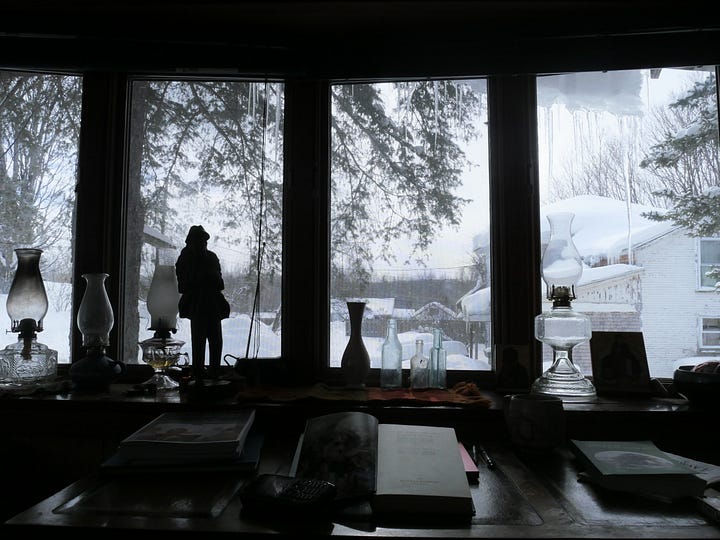


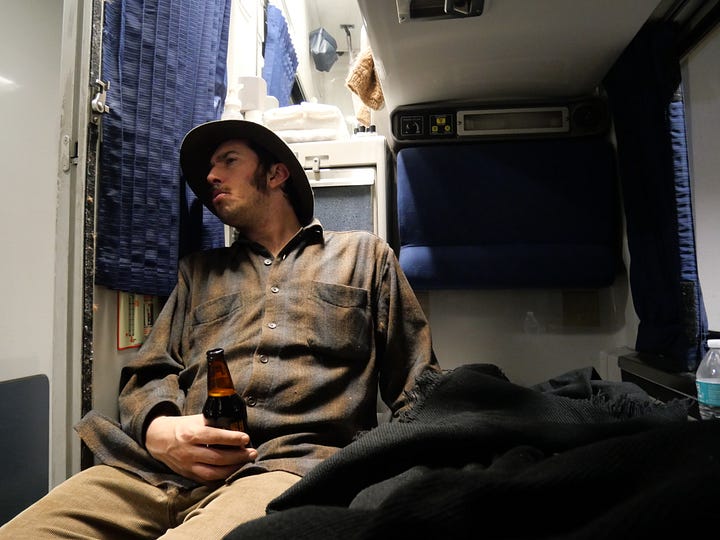
Michigan, New York, New Hampshire, Indiana, Colorado, Wyoming, Montana, Nevada, California, New Mexico, Missouri – they passed underneath my boots with harrowing speed. And where once this speed did not bother me so much (for it was accompanied by the strange and uniquely beautiful depth one often finds as a hitchhiker) it quickly began to gnaw at me. I was running circles around former routes, touching them briefly, and insulating myself from them by renting motel rooms and booking tickets on buses and trains. Deadlines mounted, my obligations to Hickman’s Hinterlands piled up – and meanwhile the heat was running on overtime at my empty house back up north. Soon, my wife was with child, and wanted only to nap and to eat and to nap and to eat. Book deal offers came. Magazines reached out. Imbroglios on Twitter proliferated. Paying subscribers unsubscribed in worryingly large numbers, usually without reason. Travel logistics needed to be figured, almost daily, and the realities of car-free, no-hitchhiking travel in the hinterlands proved to be staggeringly complicated. The costs of the travel were eating so deeply into my pay I realized I could’ve made out better as a cashier at Dollar General. And my eyes were red – tired, emptied-out, too distracted to read or think or really do much of anything.
What a far cry all this is from how I am now living! And thank God! To watch the icicles lengthen over the bay window before which my desk has been positioned – to lounge and read upon the rocking-chair in my bright-red suit of long-johns as the thermometer plummets and the snow blows across my street in plumes of clean white! Smoke gyrates ever upward over cabin chimneys, like Genies rising from the Arab’s lamp – oily black coffee-cups and flapjacks and cackling telephone calls from the village Mayor! Now, I can take all that I have seen and done and arrange it upon my desk for more serious contemplation; I can arrange the little notes I’ve received from so many towns and villages and buses and trains and sew them into some kind of a readable quilt. Now, I can sift through all of this – and as I do so, I can affix my eyes upon the Star Spangled Banner, placing my hand upon my wife’s bulging stomach, where the future of this country now sleeps in swirling ectoplasm.
So, then – in all this, how could we say that the Falling Back in Love With America project is over? Far from this, it appears to have just begun, for I have embraced a biographical arc that mimicks the historical arc of this great country. Part One is the period of chaos and mad flight across the land – the snake-oil sales and boom-town benders, Indian raids and scalpings, the broken wagon wheels and bush meat and Sunday speaking-in-tongues at the tent revivals. William Jennings Bryan on a derailed train – used car salesmen taking Quaaludes somewhere south of Stockton. Motel neon and hitchhiking under Oklahoma thunderheads – running from the law and skirting down across the Chihuahua borderline with revolver in hand.
But then, Part Two – the lawman cometh, the electrical lines unfurl over the towheaded heads of the village lads. Drywall and silicon, polyester jeans – microwavable dinners and telephonic stock options trades. A permit and inspection; mamaw’s rocking chair on the porch. Swimming holes and fireworks and a steady 8-to-5 at the mill as NAFTA comes up on the TV screen. Those little machines at the DMV where you take your ticket – power windows and FM radio with Steve Earle and a digital display. The big cigarette off I-81 is getting rusty, and the cousins are on a plane to Afghanistan to kick some ass. And the statue of the Christ-child gleameth in the manger – the delicate ivory of yesteryear hath curled round the fingers of babes, and old photographs go ‘round the kitchen as the Junetime rains of memory pound the roof that grandpa made.
There is something to this tension, and it’s a thing I’ve lived and touched; a balance contained within the hearts of all men spread over the earth – but made to contrast much more deeply in the American’s life and mind. The old codger who got his first telephone makes his first call to his brother, saying “I miss the old days” softly – and the fellow who runs the wire up mumbles to his compatriot that “times are changin’ too fast” for his liking. We build the Brave New World with enthusiasm and courage, receiving the overtaxed paycheck that such labors bring us, knowing only dimly that we’re constructing the comfortable throne on which we’ll one day pine for the past.
The hobo himself leans back and takes a long draw from his bottle high up in his seldom-seen village, smirking at the whole display from sea to shining sea. He sees it, even if these days he never leaves to venture out into it anymore. He feels the heartbeat of the country as he stations himself porchside – knows the shape of the thing has crept up into his bones and laughs at him from high upon the Hemlock hills of home. But he’s made a resolution now, and on that score he’s sure – the road looks mighty better when he’s off it, and as a courtesy to its good looks, he’ll abide. The memories of his conquests? He makes them into knick-knacks for his mantle, and his miles turn into pebbles in his cabbage-patch – he’s gone around the horn by now, come full circle to the blessed end of an old American story, and he savors it well.
That man is me, and I welcome the change – I know I’ve met the true end of my wildest days. The grand finale now is to put those years up on the page. It’ll take me time. And it’ll never really end, either. There’ll still be trips – I doubt I can swear them off completely – but they’ll be measured, definite, and clarified. They’ll be carried out within tighter lines. Where once I took to the road to shake off my darkness or to gratify my buckish hunger for more miles, now, if I do leave, it’ll be with a few more reservations than before. So begins my life as a little old man, well before my time has come – I had might as well beat the rush and habituate myself to the householder’s life. Keep a library and a garden and run a trap line. Whittle spoons on the village green.
Perhaps in so doing I can become a luminary of Yokeldom – a burning ember of an old form of America that refuses to die and lives on brightly here on the rocking chair by my woodstove and in the potholed streets of my unknown village. An ember that exemplifies the very thing I have ever sought to find in my travels. I have realized that if you’re searching for something rare – you’re certainly free to go on and become the rare thing you were looking so hard for. Nothing prevents it at all. And where once I wandered around looking for the real “characters” out in America’s hinterlands – I have come to accept that it’s my mantle to embrace my role as one of those characters. Finished are my days of being a “rolling stone that gathers no moss” – now’s my time to gather up so much moss it’s damn near a world record. Let the years cover me like a pile of scrap metal or firewood – let the beard grow so long you can’t see my belt. Let my mouth hang agape for the mosquitoes to visit as I think to myself out in the swamp. Lichens will cover me – woodchucks will live in my pockets. And when a visitor comes – he’ll remember. He’ll remember America.
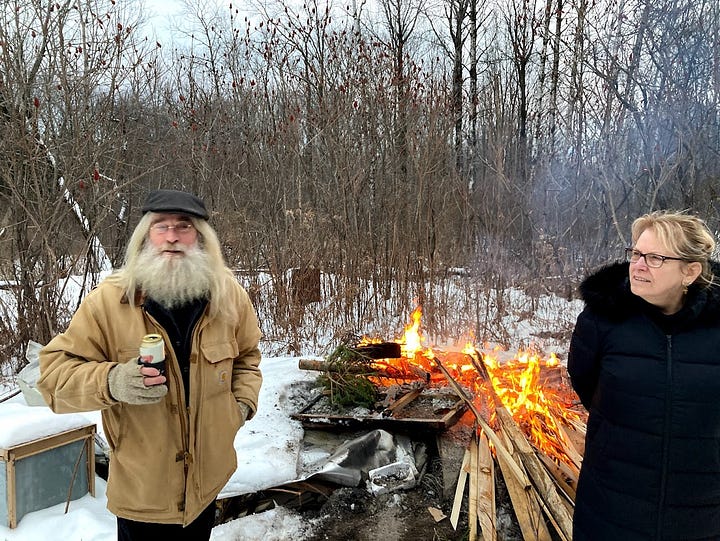

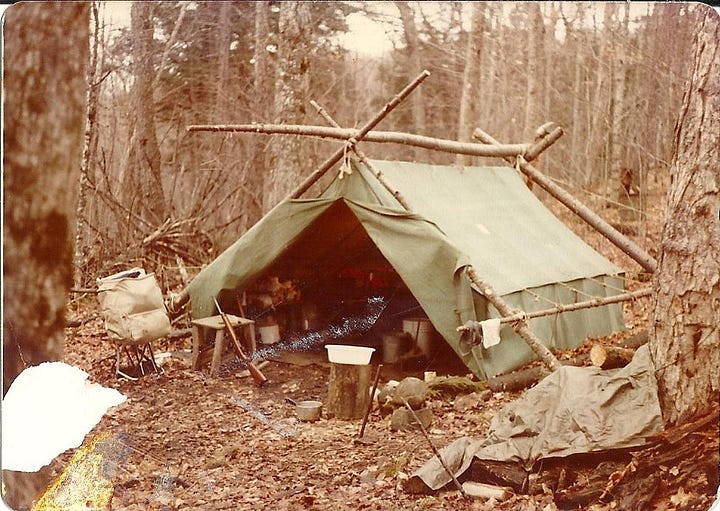
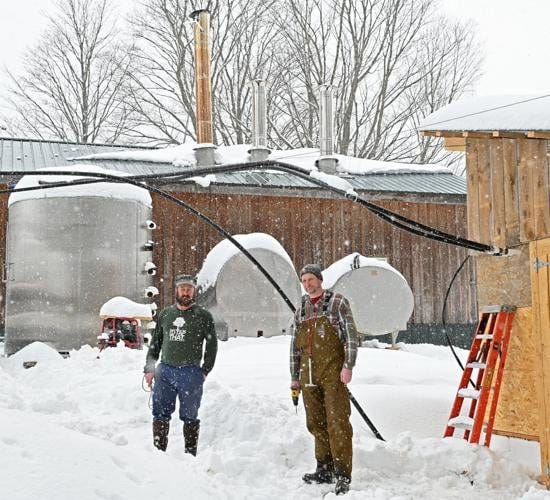
Til then, essays with The Free Press will continue, and besides that, I’ve got a list of eighty essay titles that I’ve got to write for you all. I can’t believe I’ve even got eighty essays in my head, but I’m telling ya – I do. And if you stick around here, you’ll read them, or listen to me read them. Those of you who’ve been paying me to do this, well, God bless you – there isn’t a scrap of food my pregnant wife eats that you didn’t pay for. When that baby comes, I’ll be able to tell ‘em that every fiber of their little body was built on the good will of Hickman’s Hinterlands readers — and ain’t that something! You all should know, too that there isn’t a mile of our travels that you won’t hear about over the next few months. And someday soon, I’ll be inviting you over here – for a backwoods bash, a symposium of American bumpkins, an Adirondack soiree the likes of which you wouldn’t believe. I can’t quite think of anything I’d enjoy more than sitting around a bonfire with you good people, sharing a few brews and swapping stories, ideas, and perhaps even hatching plans.
On the point of getting together in real life, I’m quite serious – paying subscribers to Hickman’s Hinterlands will be invited here regularly. It is my intention to form an incorporated, private club, where subscription monies here suffice for the membership fee – and to then begin to operate our barn as a small-time ‘hostel’ and event space. The club’s purpose will be to erode the line between “online” and “real life”. We’ll do monthly get-togethers for the locals or whomever happens to be traveling by – and we’ll have annual parties for folks from all over the country who love the American hinterlands. Eventually I might even get my guiding license and guide some canoe trips, or buy a storefront downtown for a clubhouse with regular open hours and refreshments served. This train goes as far as you want it to. Could wind up with a radio station, a snail-mail newsletter, a dinghy cruising the Saint Lawrence Seaway, or a big tract of acreage for everyone to camp on. The possibilities are limited only by what you wish to see done. However it ends, and wherever this weird, wild ride ends up – I hope you’ll come with us, and I do suspect that we’ll have a lot of fun along the way.
Take care, God bless, and expect another hot one coming to your inbox real soon.
A.M. Hickman
(from an undisclosed location in the Adirondack Mountains)
February 2025




Listened to this while road tripping with the family south to Florida in one of those damned automobiles you have decided to live without yet may as well have been the cornerstone to the foundation of your new home.
Life is full of chaos and contradictions, and crossroads where a trucker like me meets a former vagabond like you.
Can’t wait to meet the baby and bring my tools so as to help with the sagging beams. I think it only fitting that a member of the tribe who carried you across the land so often would reenforce your home.
The Abrahamic wanderings are over, you have entered your promised land. Now the settling in and filling the earth begins. May God bless you with fertility of mind, soul, earth and family life.